外研版八年级(上)Module6 Animals in danger同步练习
- 格式:docx
- 大小:29.85 KB
- 文档页数:8
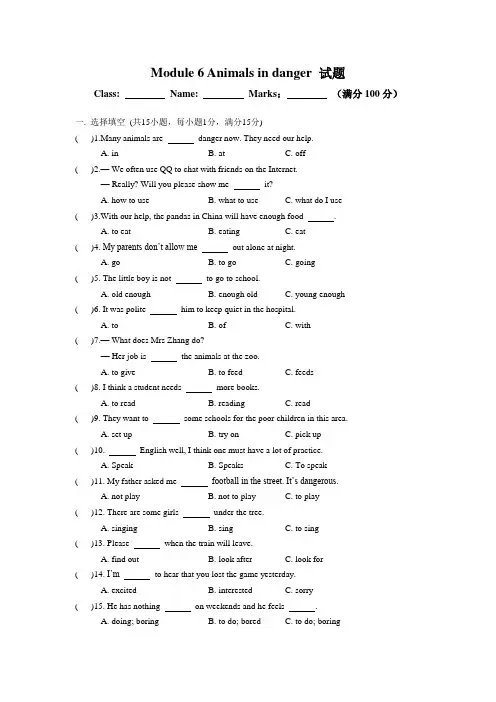
Module 6 Animals in danger 试题Class: Name: Marks:(满分100分)一. 选择填空(共15小题,每小题1分,满分15分)( )1.Many animals are danger now. They need our help.A. inB. atC. off( )2.— We often use QQ to chat with friends on the Internet.— Really? Will you please show me it?A. how to useB. what to useC. what do I use( )3.With our help, the pandas in China will have enough food .A. to eatB. eatingC. eat( )4. My parents don’t allow me out alone at night.A. goB. to goC. going( )5. The little boy is not to go to school.A. old enoughB. enough oldC. young enough( )6. It was polite him to keep quiet in the hospital.A. toB. ofC. with( )7.— What does Mrs Zhang do?— Her job is the animals at the zoo.A. to giveB. to feedC. feeds( )8. I think a student needs more books.A. to readB. readingC. read( )9. They want to some schools for the poor children in this area.A. set upB. try onC. pick up( )10. English well, I think one must have a lot of practice.A. SpeakB. SpeaksC. To speak( )11. My father asked me football in the street. It’s dangerous.A. not playB. not to playC. to play( )12. There are some girls under the tree.A. singingB. singC. to sing( )13. Please when the train will leave.A. find outB. look afterC. look for( )14. I’m to hear that you lost the game yesterday.A. excitedB. interestedC. sorry( )15. He has nothing on weekends and he feels .A. doing; boringB. to do; boredC. to do; boring二. 完形填空(共15小题,每小题1分,满分15分)When my son Mike was young, he always listened to me. I hoped he would be a 16 , so I asked him to 17 playing the piano every day. He did 18 I told him to do. But when he grew older, he 19 practised the piano. He said that he started to be 20 the guitar. I didn’t say 21 but told him that I still wanted him to be a pianist. As the years passed, it seemed that Mike started to 22 everything I wanted him to do. I knew that no matter how much you wanted to control(控制) your 23 , you had to let them go. But I still felt 24 when Mike told me that he would major in(主修) guitar courses. Why? Weren’t my 25 helpful(有益的) to him? I 26 that he should major in piano courses. One evening, I completely 27 everything. I had some trouble with 28 computer. I didn’t know what was wrong with it. I asked 29 to help me. He explained to me what to do. I 30 as what he told me. I took pride in my son and his skills. I was deeply satisfied (满足的).( )16. A. teacher B. violinist C. pianist( )17. A. stop B. practise C. forget( )18. A. how B. what C. why( )19. A. often B. usually C. never( )20. A. worried about B. interested in C. afraid of( )21. A. something B. anything C. nothing( )22. A. hate B. show C. learn( )23. A. parents B. children C. students( )24. A. sad B. happy C. lucky( )25. A. lessons B. advice C. words( )26. A. remembered B. knew C. suggested( )27. A. believed B. understood C. watched( )28. A. my B. his C. her( )29. A. my friend B. my husband C. Mike( )30. A. danced B. played C. did三.阅读理解。
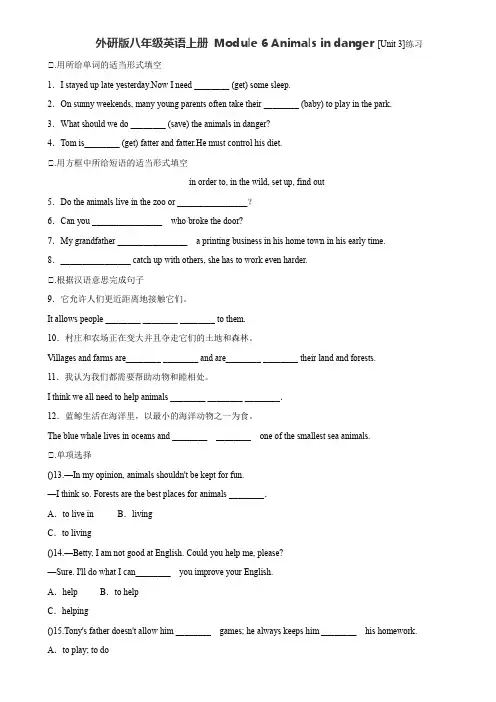
外研版八年级英语上册Module 6 Animals in danger [Unit 3]练习Ⅰ.用所给单词的适当形式填空1.I stayed up late yesterday.Now I need ________ (get) some sleep.2.On sunny weekends, many young parents often take their ________ (baby) to play in the park. 3.What should we do ________ (save) the animals in danger?4.Tom is________ (get) fatter and fatter.He must control his diet.Ⅰ.用方框中所给短语的适当形式填空in order to, in the wild, set up, find out5.Do the animals live in the zoo or ________________?6.Can you ________________ who broke the door?7.My grandfather ________________ a printing business in his home town in his early time.8.________________ catch up with others, she has to work even harder.Ⅰ.根据汉语意思完成句子9.它允许人们更近距离地接触它们。
It allows people ________ ________ ________ to them.10.村庄和农场正在变大并且夺走它们的土地和森林。
Villages and farms are________ ________ and are________ ________ their land and forests.11.我认为我们都需要帮助动物和睦相处。
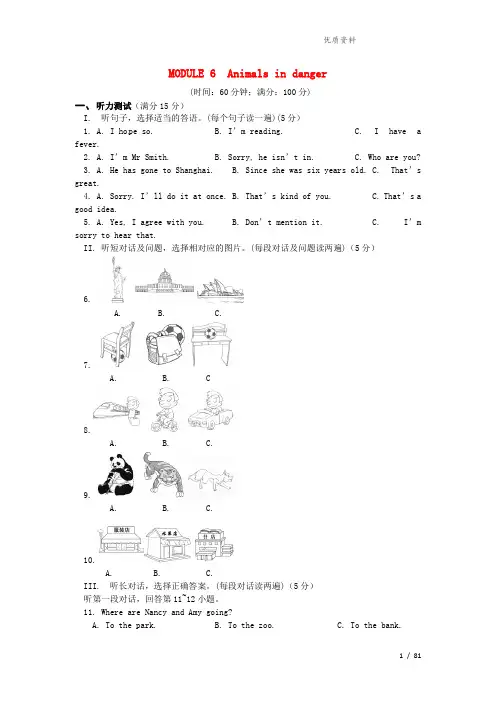
MODULE 6 Animals in danger(时间:60分钟;满分:100分)一、听力测试(满分15分)I.听句子,选择适当的答语。
(每个句子读一遍)(5分)1. A. I ho pe so. B. I’m reading. C. I have a fever.2. A. I’m Mr Smith. B. Sorry, he isn’t in. C. Who are you?3. A. He has gone to Shanghai. B. Since she was six years old. C. That’s great.4. A. Sorry. I’ll do it at once. B. That’s kind of you. C. That’s a good idea.5. A. Yes, I agree with you. B. Don’t mention it. C. I’m sorry to hear that.II.听短对话及问题,选择相对应的图片。
(每段对话及问题读两遍)(5分)6.A. B. C.7.A. B. C8.A. B. C.9.A. B. C.10.A. B. C.III.听长对话,选择正确答案。
(每段对话读两遍)(5分)听第一段对话,回答第11~12小题。
11. Where are Nancy and Amy going?A. To the park.B. To the zoo.C. To the bank.12. Which bus should Nancy and Amy take?A. No.890.B. No.980.C. No.970.听第二段对话,回答第13~15小题。
13. What did Jane do this morning?A. She went shopping.B. She posted a letter.C. She went to the library.14.Where did Jane leave her cell phone?A. At home.B. On the bus.C. In a clo thing shop.15.What’s Jane going to do?A. Call her parents.B. Go to the police station.C. Write a notice of Lost and Found.二、单项填空(每小题1.5分,满分15分)16. There’s a bird _______in the tree.A. singB. singsC. singingD. to sing17. The girl from the USA wasn’t _______to carry the basket of bananas.A. too strongB. enough strongC. strong enoughD. so strong18. The old found _______accept the young’s new idea.A. hardB. it hardC. it hard toD. it is hard to19. We all think nothing can make the brave soldiers _______their country.A. turn againstB. to turn againstC. to turn toD. turn to20. In the modern city it w as difficult for the old woman from the countryside _______a job.A. findB. to findC. lookD. to look for21. When we learn a second language, we should try our best _______the spirit of it.A. masterB. holdC. take hold ofD. to master22.In order to _______the sunrise, today all the children got up very early.A. seeB. sawC. seeingD. sees23. When Robert was a small boy, he _______playing the piano.A. was interested inB. was good forC. was good withD. was strict in24. If farmers _______the land, the animals won’t have any places to live in.A. took awayB. put upC. took offD. put on25. The American dance made me _______my aunt in Canada.A. look upB. look atC. think ofD. take care of三、完形填空(每小题1.5分,满分15分)Hey, I’m Simon. I have a strong and faithful dog, Bruce. The dog likes 26 with me. Sometimes he also follows my father to work.One morning when my father wo rked in the field, he 27 his coat and put it under a big tree. He turned to the dog and said,“ 28 my coat, Bruce!”Bruce sat down on the coat. Later, my father remembered he had to buy some food.29 he hurried to the shop. 30 shopping, he went home directly and forgot completely a bout his 31 and the dog.In the evening, I looked for my dog 32 in the house, but I 33 find him. At this time, my father suddenly remembered his coat and the dog. He went back to the tree 34 .He found that Bruce was 35 sitting on the coat!26. A. playing B. deal ing C. agreeing D. laughing27. A. took out B. took off C. took away D. looked after28. A. Watch B. Look C. See D. Listen29. A. But B. So C. Because D. Although30. A. Since B. Before C. After D. Until31. A. shop B. food C. coat D. toy32. A. somewhere B. everywhere C. nowhere D. anywhere33. A. could B. couldn’t C. d on’t D. doesn’t34. A. at once B. after all C. as usual D. other than35. A. yet B. even C. still D. already四、阅读理解(每小题2分,满分20 分)AWe all know that Taiwan is considered as the Treasure Island of China. It is very beautiful. Recently we have been closely connected.Several months ago, a group of 19 Taiwanese children flew to Chengdu in order to begin a tour to study pandas. The middle school children were from Chiayi County in southwest Taiwan and were chosen because of their excellent performances at school.During the visit, the children saw pandas up close. They were very excited to see so many pandas at the same time. The children also traveled to the Mount E’mei scenic area and met local schoolchildren.At last, they said, “The pandas are very cute,and we are all happy.” They also said the children in Chengdu were very friendly to them, and they all liked there. They hoped to visit Sichuan again.36. Taiwan is considered as a _______island of China.A. valuableB. richC. beautifulD. all above37.Why did the group of 19 Taiwanese children come to Chengdu?A. Because they came to study here.B. Because they had never been here.C. Because they flew here for a tour to study pandas.D. Because they were from Chiayi County in southwest Taiwan.38.The children had a good chance to visit Chengdu because_______ .A. they were interested in itB. they did well at schoolC. they were performing different rolesD. they were not from t he same countr y39.When they visited pandas, the children were quite excited_______.A. to see so many pandas at a timeB. to climb the Mount E’meiC. to see pandasD. to find pandas very cute40.This passage mainly expresses that_______ .A. the middle school students in Taiwan must learn about pandasB. there is a good relationship between the two placesC. the children in Chengdu are very friendlyD. the students in Taiwan are excellentBLots of people were asking me the same question—How did a 22-year-old woman row(划)a 19-foot boat for 70 days? Well, when I was on the sea alone, the biggest difficulty was the feeling of being lonely.I started on January 3,2010.More than half the people who tried sailing alone often gave up in the first two weeks, so I decided to finish one-fourth of the sailing first, which took about 20 days.Day 20th,January 22 came! I said to myself that I should be happy. But I was feeling so bad. It seemed to be the hardest day for me. I didn’t see land for over two weeks. Every day I did the same—rowing, eating, sleeping, watching the sky and the ocean...Suddenly I saw someth ing breaking through the water near my boat. They were dolphins. They circled my boat and were close enough for me to touch. So I did! Suddenly I felt so moved, they came to s ay “Hello”, just when I needed it most.I was no longer lonely, believing that I would succeed.And I made it! All 2,817 miles I got to the coast on March 14,after 70 days and five hours at sea. So the secret of my success is the moment with those dolphins.41.What was the greatest trouble with the woman when she was on the sea?A. Getting sick.B. Feeling lonely.C. Getting lost.D. Being thirsty.42.How many parts did the woman divide her sailing into?A. Two.B. Three.C. Four.D. Five.43.Which part was most difficult for those people who tried sailing alone?A. The first day.B. The last day.C. The first two weeks.D. The middle of the trip.44. The underlined word “dolphin” in the fourth paragraph means “a kind of ”_______.A. friendly animalB. dangerous fishC. special plantD. beautiful bird45. What is the best title of the passage?A. Woman, As Good As Man on the SeaB. An Inter esting Task on the SeaC. Protecting Wild AnimalsD. Dolphins, the Secret of My Success五、根据句意及汉语提示完成单词(每小题2分,满分10分)46.She wants to tell people to_______(保护) birds.47.Which animals are in_______(危险)? Do you know, Mike?48.I have no_______(足够的) money to buy vegetables and fr uit.49.Old Henry doesn’t_______(允许) us to play with his grandson.50.His English teacher looks kind of_______(瘦的).六、句型转换(每小题1分,满分5分)51. My father got up early so that he could catch the first subway.(改为同义句)My father got up early_______ _______ _______ catch the first subway.52. Thanks for taking care of my little son.(改为同义句)Thanks for_______ _______my little son.53. Two years ago I took an interest in this old building.(改为同义句)Two years a go I_______ _______ _______this old building.54. Most birds have a safe pla ce to live.(改为否定句)Most birds_______ _______ a safe place to live.55.To think of that poor man is sad.(改为同义句)_______ _______to think of that poor man.七、书面表达(满分20分)目前,老虎正在日益减少。
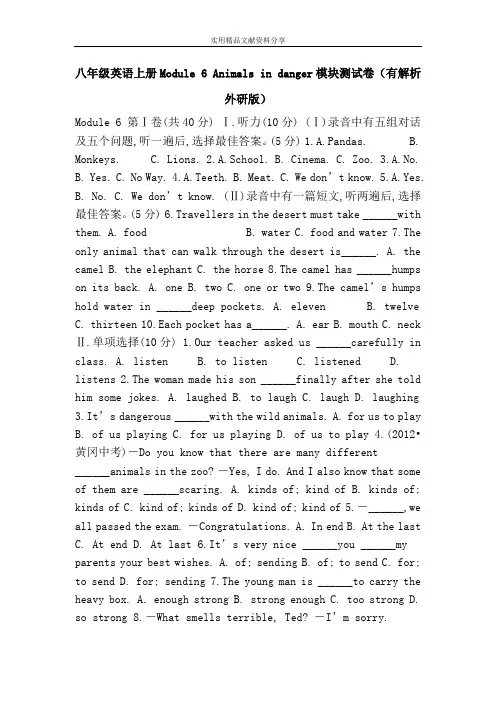
八年级英语上册Module 6 Animals in danger模块测试卷(有解析外研版)Module 6 第Ⅰ卷(共40分) Ⅰ.听力(10分) (Ⅰ)录音中有五组对话及五个问题,听一遍后,选择最佳答案。
(5分) 1.A.Pandas. B. Monkeys. C. Lions. 2.A.School. B. Cinema. C. Zoo. 3.A.No.B. Yes.C. No Way. 4.A.Teeth. B. Meat. C. We don’t know. 5.A.Yes.B. No.C. We don’t know. (Ⅱ)录音中有一篇短文,听两遍后,选择最佳答案。
(5分) 6.Travellers in the desert must take ______with them. A. food B. water C. food and water 7.The only animal that can walk through the desert is______. A. the camel B. the elephant C. the horse 8.The camel has ______humps on its back. A. one B. two C. one or two 9.The camel’s humps hold water in ______deep pockets. A. eleven B. twelve C. thirteen 10.Each pocket has a______. A. ear B. mouth C. neck Ⅱ.单项选择(10分) 1.Our teacher asked us ______carefully in class. A. listen B. to listen C. listenedD. listens 2.The woman made his son ______finally after she told him some jokes. A. laughed B. to laugh C. laugh D. laughing3.It’s dangerous ______with the wild animals. A. for us to playB. of us playingC. for us playingD. of us to play 4.(2012•黄冈中考)―Do you know that there are many different______animals in the zoo? ―Yes, I do. And I also know that some of them are ______scaring. A. kinds of; kind of B. kinds of; kinds of C. kind of; kinds of D. kind of; kind of 5.―______,we all passed the exam. ―Congratulations. A. In end B. At the last C. At end D. At last 6.It’s very nice ______you ______my parents your best wishes. A. of; sending B. of; to send C. for; to send D. for; sending 7.The young man is ______to carry the heavy box. A. enough strong B. strong enough C. too strong D. so strong 8.―What smells terrible, Ted? ―I’m sorry.I’ll______ my shoes and wash them at once. A. take away B. put away C. move away D. get away 9.There are many people ______the movie Lost in Thailand these days. A. watch B. to watch C. watching D. watched 10.There are many rules in Mary’s home. For example, her parents won’t allow her ________out late. A. to stay B. staying C .stay D. stayed Ⅲ.完形填空(10分) India is the__1__of tigers. Every year many people are killed by tigers.__2__,the tiger does not always eat men. It likes wild animals__3__.It is only when the tiger is old or wounded(受伤的)that it eats men. But once it has tasted the flesh of men, it goes on killing men__4__food.When a man-eater__5__this is discovered, people are very__6__.They have to stop__7__in the field. There are many ways__8__such dangerous animals. One way is that some men__9__long guns ride on elephants while other men drive the tiger towards them.__10__way of all is to hunt a tiger on foot. Because the man must be brave and can shoot well or he would be killed by the tiger. 1.A.house B. room C. door D. home 2.A.However B. And C. Because D. Why 3.A.well B. good C. better D. best 4.A.at B. with C. on D. for 5.A.atB. onC. likeD. in 6.A.happy B. afraid C. excited D. friendly7.A.work B. working C. worked D. to work 8.A.to kill B. killingC. killD. killed 9.A.with B. in C. for D. by 10.A.The dangerous B. The more dangerous C. The safest D. The most dangerous Ⅳ.阅读理解(10分) Now people are trying to make the world a better place for birds to live in. People in China start the Bird Loving Week. Students from all parts of the country have been doing something to care for birds. Meng Yiru, a 16-year-old student from Nanyang Model High School in Shanghai, asked people to protect birds: Never put birds in cages. Go to visit them in the wild if you really love them.“I’ll never forget the little sparrow(麻雀)I kept in a cage,” said Meng. “Itstopped eating after I caught it and soon died.” Meng and her classmates put many of their ideas in their 300-word report to ask people to take better care of birds. China is the home of more than 1,000 kinds of birds because the country is large and has almost every weather type to suit them. But not everyone knows how to take good care of them. Some cut down trees and destroy the bird’s homes. This has made the number of the birds go down quickly. A study shows that one out of eight birds, more than 1,200 kinds, in the world could die out. This includes 95 percent of albatrosses(信天翁)and 60 percent ofcranes(鹤).Some birds you see every day, like pigeons and parrots, are also in danger! To help them, people have set up 7,500 reserves which are suitable and safe for the birds. In China, there are big reserves like the ones near the Dongting Lake in Hunan and the Poyang Lake in Jiangxi. Is there anything that you can do for birds? Take care of their homes. Feed them with something delicious. Well, think it over and begin to do it now! 1.China is the home of many kinds of birdsbecause________. A. people in China love birds B. people in China have planted a lot of trees C. people in China don’t eat birds D. it is large and has almost every weather type to suit them 2.Meng Yiru kept a sparrow______. A. for several months B. and soon it died C. and then set it free D. and then gave it to her classmate 3.Some people cut down trees and________.A. it may make our environment betterB. they can plant more cropsC. it may kill the birdsD. they can build more reserves 4.A study shows that ________of the birds may die out. A. one eighth B. half C. two thirds D. thirty percent5.The underlined word “reserves” probably means“________”.A.自然保护区B.聚居地C.野生动物园D.养鸟场第Ⅱ卷(共60分) Ⅴ.词汇运用(10分) (Ⅰ)根据句意及首字母或汉语提示完成单词。
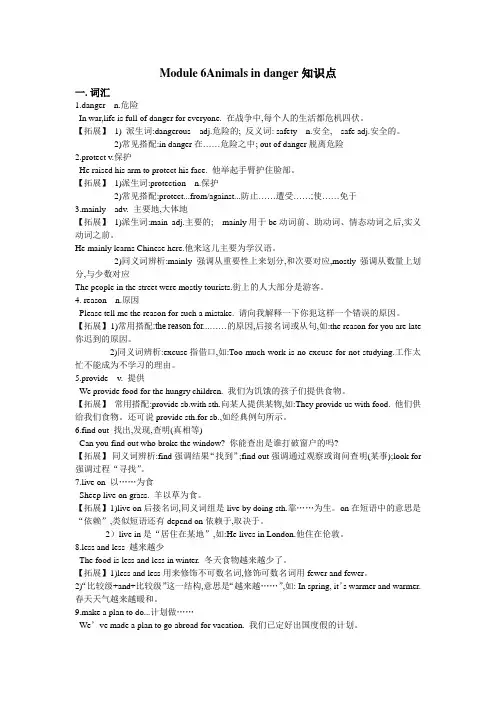
Module 6Animals in danger知识点一.词汇1.danger n.危险In war,life is full of danger for everyone. 在战争中,每个人的生活都危机四伏。
【拓展】1) 派生词:dangerous adj.危险的; 反义词: safety n.安全, safe adj.安全的。
2)常见搭配:in danger在……危险之中; out of danger脱离危险2.protect v.保护He raised his arm to protect his face. 他举起手臂护住脸部。
【拓展】1)派生词:protection n.保护2)常见搭配:protect...from/against...防止……遭受……;使……免于3.mainly adv. 主要地,大体地【拓展】1)派生词:main adj.主要的; mainly用于be动词前、助动词、情态动词之后,实义动词之前。
He mainly learns Chinese here.他来这儿主要为学汉语。
2)同义词辨析:mainly 强调从重要性上来划分,和次要对应,mostly强调从数量上划分,与少数对应The people in the street were mostly tourists.街上的人大部分是游客。
4. reason n.原因Please tell me the reason for such a mistake. 请向我解释一下你犯这样一个错误的原因。
【拓展】1)常用搭配:the reason for...……的原因,后接名词或从句,如:the reason for you are late 你迟到的原因。
2)同义词辨析:excuse指借口,如:Too much work is no excuse for not studying.工作太忙不能成为不学习的理由。
5.provide v. 提供We provide food for the hungry children. 我们为饥饿的孩子们提供食物。
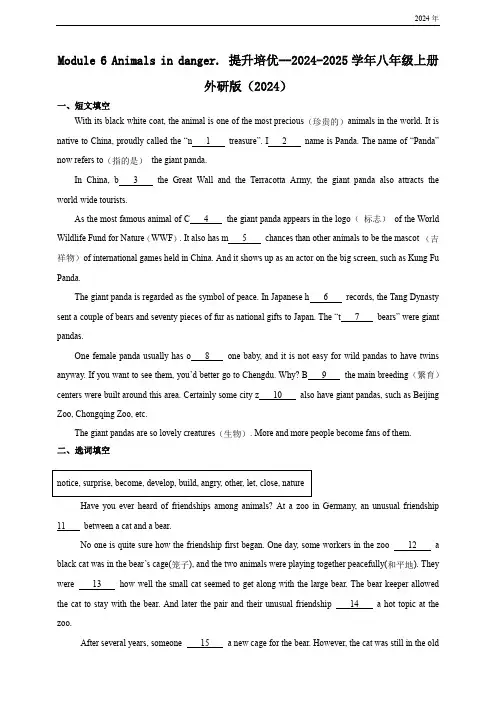
Module 6 Animals in danger. 提升培优--2024-2025学年八年级上册外研版(2024)一、短文填空With its black-white coat, the animal is one of the most precious(珍贵的)animals in the world. It is native to China, proudly called the “n 1 treasure”. I 2 name is Panda. The name of “Panda” now refers to(指的是)the giant panda.In China, b 3 the Great Wall and the Terracotta Army, the giant panda also attracts the world-wide tourists.As the most famous animal of C 4 the giant panda appears in the logo(标志)of the World Wildlife Fund for Nature(WWF). It also has m 5 chances than other animals to be the mascot (吉祥物)of international games held in China. And it shows up as an actor on the big screen, such as Kung Fu Panda.The giant panda is regarded as the symbol of peace. In Japanese h 6 records, the Tang Dynasty sent a couple of bears and seventy pieces of fur as national gifts to Japan. The “t 7 bears” were giant pandas.One female panda usually has o 8 one baby, and it is not easy for wild pandas to have twins anyway. If you want to see them, you’d better go to Chengdu. Why? B 9 the main breeding(繁育)centers were built around this area. Certainly some city z 10 also have giant pandas, such as Beijing Zoo, Chongqing Zoo, etc.The giant pandas are so lovely creatures(生物). More and more people become fans of them.二、选词填空Have you ever heard of friendships among animals? At a zoo in Germany, an unusual friendship 11 between a cat and a bear.No one is quite sure how the friendship first began. One day, some workers in the zoo 12 a black cat was in the bear’s cage(笼子), and the two animals were playing together peacefully(和平地). They were 13 how well the small cat seemed to get along with the large bear. The bear keeper allowed the cat to stay with the bear. And later the pair and their unusual friendship 14 a hot topic at the zoo.After several years, someone 15 a new cage for the bear. However, the cat was still in the oldcage, so it walked around 16 and cried to be with the bear. The bear keeper finally took pity on(同情) the cat and 17 it stay with the bear. The cat and the bear got 18 than before. They often sat together and shared meals in the sun.Sometimes it may be 19 for animals to have their own ideas about who would be a good friend. These may surprise humans, who usually expect animals to form relation-ships with 20 of the same species.三、补全对话根据对话内容,从所给的七个选项中选出可以填入空白处的最佳选项,使对话内容完整,有两项为多余选项。
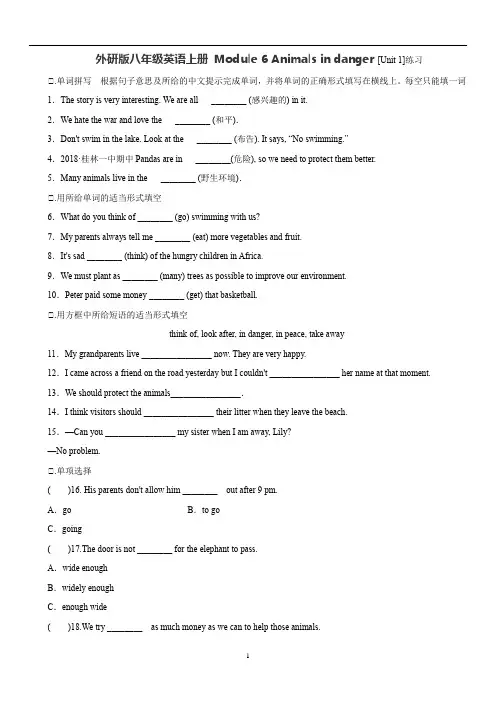
外研版八年级英语上册Module 6 Animals in danger [Unit 1]练习Ⅰ.单词拼写根据句子意思及所给的中文提示完成单词,并将单词的正确形式填写在横线上。
每空只能填一词1.The story is very interesting. We are all ________ (感兴趣的) in it.2.We hate the war and love the ________ (和平).3.Don't swim in the lake. Look at the ________ (布告). It says, “No swimming.”4.2018·桂林一中期中Pandas are in ________(危险), so we need to protect them better.5.Many animals live in the ________ (野生环境).Ⅰ.用所给单词的适当形式填空6.What do you think of ________ (go) swimming with us?7.My parents always tell me ________ (eat) more vegetables and fruit.8.It's sad ________ (think) of the hungry children in Africa.9.We must plant as ________ (many) trees as possible to improve our environment.10.Peter paid some money ________ (get) that basketball.Ⅰ.用方框中所给短语的适当形式填空think of, look after, in danger, in peace, take away11.My grandparents live ________________ now. They are very happy.12.I came across a friend on the road yesterday but I couldn't ________________ her name at that moment. 13.We should protect the animals________________.14.I think visitors should ________________ their litter when they leave the beach.15.—Can you ________________ my sister when I am away, Lily?—No problem.Ⅰ.单项选择()16. His parents don't allow him ________ out after 9 pm.A.go B.to goC.going()17.The door is not ________ for the elephant to pass.A.wide enoughB.widely enoughC.enough wide()18.We try ________ as much money as we can to help those animals.A.raise B.to raiseC.raised()19.Michael visits many websites ________ about Chinese culture.A.learn B.learnedC.to learn()20.We should do what we can to ________ our environment and make the earth a better place for us to live. A.produce B.recycleC.protectⅠ.口语运用根据对话内容,从方框中的六个选项中选出五个合适的句子补全对话。
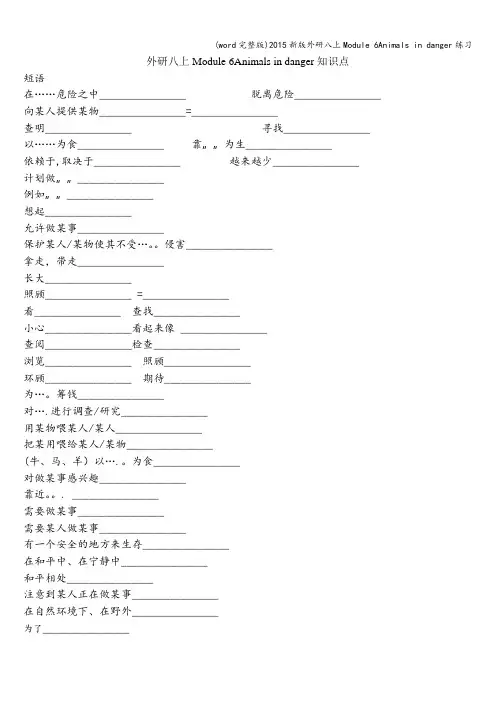
外研八上Module 6Animals in danger知识点短语在……危险之中________________ 脱离危险________________向某人提供某物________________=________________查明________________ 寻找________________以……为食________________ 靠……为生________________依赖于,取决于________________ 越来越少________________计划做……________________例如……________________想起________________允许做某事________________保护某人/某物使其不受…。
侵害________________拿走,带走________________长大________________照顾________________ =________________看________________ 查找________________小心________________看起来像 ________________查阅________________检查________________浏览________________ 照顾________________环顾________________ 期待________________为…。
筹钱________________对….进行调查/研究________________用某物喂某人/某人________________把某用喂给某人/某物________________(牛、马、羊)以….。
为食________________对做某事感兴趣________________靠近。
. ________________需要做某事________________需要某人做某事________________有一个安全的地方来生存________________在和平中、在宁静中________________和平相处________________注意到某人正在做某事________________在自然环境下、在野外________________为了________________建立、创立、树立________________养成好的习惯________________让某人做某事________________阻止。
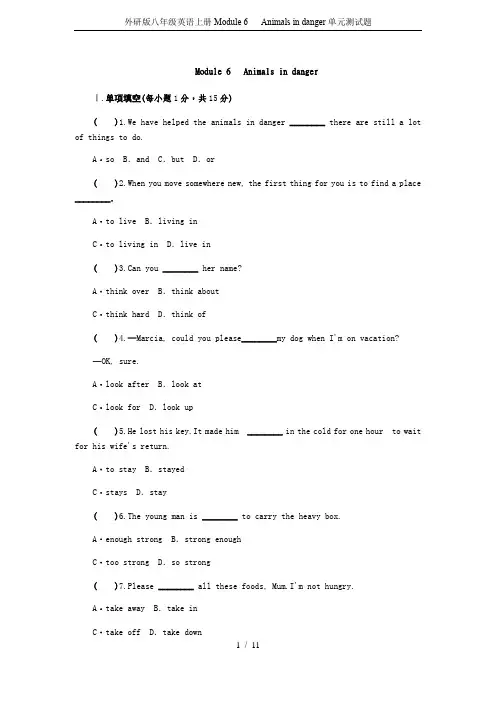
Module 6 Animals in dangerⅠ.单项填空(每小题1分,共15分)( )1.We have helped the animals in danger ________ there are still a lot of things to do.A.so B.and C.but D.or( )2.When you move somewhere new, the first thing for you is to find a place ________.A.to live B.living inC.to living in D.live in( )3.Can you ________ her name?A.think over B.think aboutC.think hard D.think of( )4.—Marcia, could you please________my dog when I'm on vacation?—OK, sure.A.look after B.look atC.look for D.look up( )5.He lost his key.It made him ________in the cold for one hour to wait for his wife's return.A.to stay B.stayedC.stays D.stay( )6.The young man is ________ to carry the heavy box.A.enough strong B.strong enoughC.too strong D.so strong( )7.Please ________ all these foods, Mum.I'm not hungry.A.take away B.take inC.take off D.take down( )8.Whenever you have a chance________English, you should take it.A.speak B.to speakC.spoke D.speaks( )9.When you leave, please turn off the lights ________ energy.A.save B.to saveC.saving D.saved( )10.I always tell my students ________ on the road because it's really dangerous.A.not to play B.to play notC.not playing D.not play( )11.The research centre has made a plan ________ pandas.A.help B.helpingC.to help D.helped( )12.—Jack, could you help me ________ when the plane will take off on the Internet?—I'm sorry.My computer doesn't work.A.get out B.look outC.take out D.find out( )13.The parents don't allow their daughter ________ at night.A.to go out B.going outC.go out D.went out( )14.China is going to ________ a manned space station around 2020 to explore more space.A.set up B.put upC.wake up D.turn up( )15.White has always been a(n)________of purity(纯洁)in Western culture.A.symbol B.reasonC.example D.presentⅡ.完形填空(每小题2分,共20分)Sea lions are mostly found on sandy beaches and around rocks all around the world, but mostly in Australia.Sea lions eat fish and some__16__ animals in the ocean.It can be quite dark in the ocean, __17__sea lions can find their way around.Sea lions are good__18__.They can dive 35 feet or deeper.If they dive too deep, they can run out of air and__19__ in the water.Sea lions are great swimmers, too.They can__20__ at a speed of 40 kilometres an hour.This helps them__21__ away from whales and sharks, but not from human beings(人类)!__22__ year a lot of sea lions die painfully.Thousands of sea lions are killed__23__their skin and oil.That's__24__bad.A sea lion is a very beautiful animal! We need to keep this animal alive, always and forever! And we must__25__ them from disappearing in the world, or our grandchildren may have no chance to see them.( )16.A.sour B.smallC.bad D.orange( )17.A.and B.but C.so D.or( )18.A.runners B.driversC.divers D.swimmers( )19.A.work B.sleep C.live D.die( )20.A.swim B.get C.leave D.grow( )21.A.walk B.run C.take D.look( )22.A.Each B.AnotherC.The D.That( )23.A.to B.for C.with D.on( )24.A.only B.not C.really D.just( )25.A.clean B.foundC.discover D.protectⅢ.阅读理解(每小题2分,共18分)ANorth American black bears are shy animals. They are fearful by nature, and will usually run away if they see or hear people. Because of this, it can be difficult for scientists to learn about these animals.In order to study black bears, researchers from New Jersey, the US, catch bears and use drugs to help them go to sleep. Researchers then work out the size and the weight of the bear, take blood to test for diseases, remove a tooth and take it to the lab to find out its age. From these studies, researchers want to find out how many bears live in New Jersey, how long they live, and how many babies they produce.But in Minnesota, the US, researchers study bears that are completely awake. The bears know the researchers' voices and they are not afraid of the research team. With the help of a few grapes to keep the bears busy, researchers can touch them to check their hearts, look at their teeth, and do other jobs. Researchers can also walk or sit with bears for hours and make videos to learn about their everyday life.In both places, the main purpose is the same—to make sure there is a healthy population of black bears. But the research methods and the kinds of information that researchers are able to collect are quite different.( )26.In the first paragraph, we can learn that North American black bears are ________.A.shy and fearful animalsB.not found todayC.well known to scientistsD.not afraid of people( )27.The word “remove” in the second paragraph probably means “________”in Chinese.A.拔下 B.移植 C.清洗 D.修补( )28.Which of the following may NOT be included in the New Jersey studies on bears?A.The age.B.The way of their communication.C.The weight.D.The number of babies they produce.( )29.In the Minnesota studies, researchers ________.A.can never get close to the bearsB.study the bears while they are asleepC.use grapes to make the bears fullD.learn a lot about the bears' everyday life( )30.What do the two studies have in common?A.Research places.B.The main purpose.C.Research methods.D.Collected information.BThe brown bears at Helsinki's Korkeasaari Zoo received a particular treat, thanks to the generosity of a young boy. Twelveyearold Otso Riiali donated 200 euros to the zoo to give the bears new climbing trees, without which he thought they would be in danger.Otso, from the small town of Karjalohja west of Helsinki, says he saved up the money by selling 400 bottles of homemade berry juice with the help of his grandmother. “It was hard work and my back hurt badly from all the bending in the forest while I was picking berries,” said Otso.A visit to the bear shelter a few years ago drove Otso to bring some cheer to the animals, which he said didn't seem energetic.“Otso could have kept all he made by means of selling juice for himself, but he made a decision to give part of it to help ani mals. Otso showed an unusual ability to act. He did not stop at seeing what a bad situation the bears were in. Instead,he began to act in a practical way and made it.”The zoo gladly accepted Otso's donation. However, bear caretaker Tiina Koivu mentioned that the bears' footdragging(步履蹒跚) at the time of Otso's visit was caused by the summer heat.It happens that the name Otso is also an old Finnish(芬兰的)word for bear. “I was born to be a bear lover,” said Otso with a smile.( )31.The underlined word “euros” in the first paragraph probably means a kind of ________.A.food B.treeC.animal D.money( )32.According to the passage, all of the following words can be used to describe Otso's quality EXCEPT ________.A.generous B.hardworkingC.modest D.warmhearted( )33.The right order(顺序) of what happened to Otso is ________.①The zoo accepted Otso's donation with gladness.②He made berry juice with the help of his grandmother.③He paid a visit to the bear shelter a few years ago.④He picked berries in the forest though it was hard.A.②④③① B.③④②①C.④③①② D.③④①②( )34.What's the main idea of the passage?A.Otso means bear in Finnish.B.Otso made a donation to help the bears.C.Otso could make berry juice.D.Otso visited a zoo.Ⅳ.用所给单词的适当形式填空(每小题1分,共10分)35.Lucy is very ________(interesting) in listening to pop music.36.There are about one hundred people ________(live) in the mountains.37.The problem is ________(make) a right choice.38.He thought of a new way ________(save) water.39.The bamboo forests are getting ________(small) today.40.Enjoy ________(read), children! You can get more knowledge.41.We chose Henry ________(be) chairperson.42.Giant pandas are in ________(dangerous)because people are taking away their land.43.It's difficult for pandas ________(have) many babies.44.Everyone should do something ________(help) the wild animals.Ⅴ.根据汉语意思完成句子(每小题2分,共10分)45.他带走了一大笔钱。
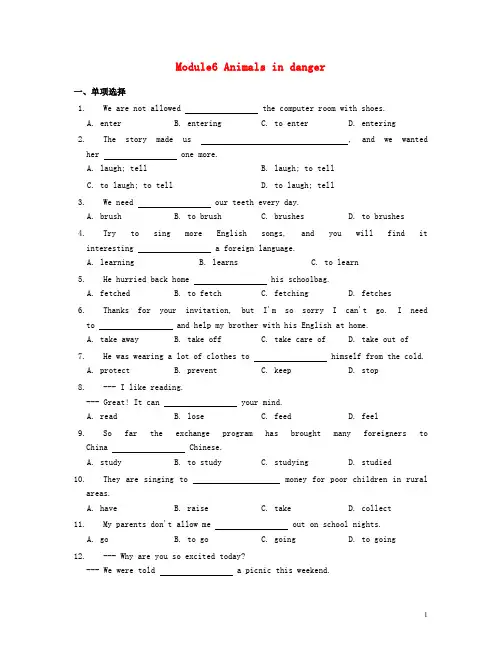
Module6 Animals in danger一、单项选择1. We are not allowed the computer room with shoes.A. enterB. enteringC. to enterD. entering2. The story made us , and we wantedher one more.A. laugh; tellB. laugh; to tellC. to laugh; to tellD. to laugh; tell3. We need our teeth every day.A. brushB. to brushC. brushesD. to brushes4. Try to sing more English songs, and you will find itinteresting a foreign language.A. learningB. learnsC. to learn5. He hurried back home his schoolbag.A. fetchedB. to fetchC. fetchingD. fetches6. Thanks for your invitation, but I'm so sorry I can't go. I needto and help my brother with his English at home.A. take awayB. take offC. take care ofD. take out of7. He was wearing a lot of clothes to himself from the cold.A. protectB. preventC. keepD. stop8. --- I like reading.--- Great! It can your mind.A. readB. loseC. feedD. feel9. So far the exchange program has brought many foreigners toChina Chinese.A. studyB. to studyC. studyingD. studied10. They are singing to money for poor children in ruralareas.A. haveB. raiseC. takeD. collect11. My parents don't allow me out on school nights.A. goB. to goC. goingD. to going12. --- Why are you so excited today?--- We were told a picnic this weekend.A. haveB. to haveC. havingD. had13. The old man needed a rest, for he had done too much work.A. havingB. to haveC. hadD. have14. Try to sing some English songs, you'll find itinteresting a foreign language.A. learningB. learnsC. learnD. to learn15. They stayed up until midnight the old year out and thenew year in.A. to seeB. sawC. seeingD. for seeing二、单词拼写(单句首字母填空)16. Are you i in this movie?17. Wearing dark glasses can p your eyes from the sun.18. I used to have short hair but now I g it long.19. Mr. Wang is such a good teacher that he has succeeded in teaching r .20. He was in a very dangerous s because there were many wild animals around him.21. His favorite subject at school is science and he wants to be a s .22. --- What's the most important morning news on CCTV today?--- The Chinese g warned Japan not to hurt the feelings of the Chinese people.23. The Great wall is a s of the Chinese nation.24. Insects f on plants. They eat plants.25. There are many w animals in the forest.三、单词拼写(根据中文提示拼写单词)26. How can we (筹钱) money for the poor children?27. The young man is interested in medical (研究).28. These new types of energy cost very little and (产生) little pollution.29. I love (情景) comedy.30. The farmers are both busy (种) vegetables now.31. Qian Xuesen was a famous Chinese (科学家).32. We should (保护) the environment.33. Are you (对…感兴趣) in swimming?34. My parents don't (允许) me to stay outside on school nights.35. Is the river deep (足够) to swim in it?四、翻译(根据中文提示完成句子)36. 大象处于极大危险之中。
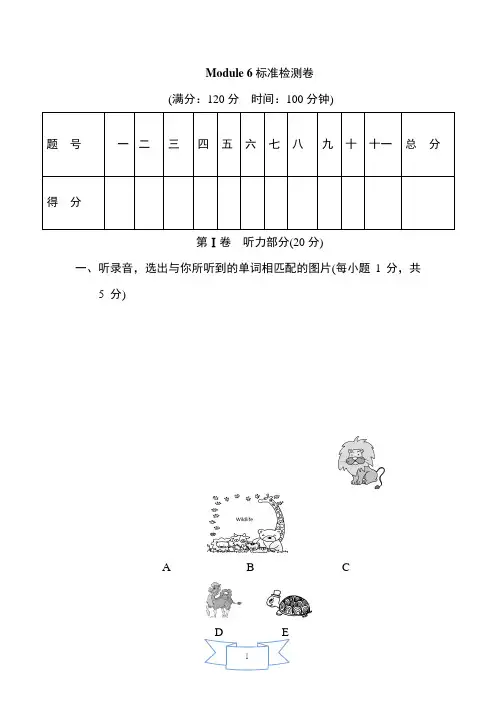
Module 6标准检测卷(满分:120分时间:100分钟)题号一二三四五六七八九十十一总分得分第Ⅰ卷听力部分(20分)一、听录音,选出与你所听到的单词相匹配的图片(每小题1分,共5 分)A B CD E1.________ 2.________ 3.________4.________ 5.________二、根据你所听到的句子选出正确的应答语(每小题1分,共5分)6.A.Because they're scary.B.Because they're cute.C.Because he's interesting.7.A.Africa.B.Sea.C.Sky.8.A.Grass. B.Dogs. C.Leaves.9.A.Grass. B.Rice. C.Meat.10.A.He teaches very well. B.He likes turtles.C.He's friendly.三、听对话,选择正确答案(每小题1分,共5分)听第一段材料,回答第11题至第12题。
11.Why does the man like pandas?A.Because they are cute.B.Because they are friendly.C.Because they are clever and cute.12.The woman thinks the lions come from ________.A.South Africa B.CanadaC.South America听第二段材料,回答第13题至第15题。
13.Who will Mary go to the zoo with?A.The man. B.Her brother.C.Her parents.14.What do some people like to give animals?A.Fruits. B.Ice cream.C.Food.15.What does the man ask Mary to do?A.Take some photos for the baby tiger.B.Play with him.C.Take him to the zoo.四、听短文,选择正确答案(每小题1分,共5分)16.Many people may think that animals in the zoo are ________.A.happy and lucky B.sadC.free17.Animals like tigers, lions and bears live on ________.A.forests B.mountains C.small animals 18.Why don't they have to find food by themselves?A.Because there isn't any food.B.Because there aren't small animals.C.Because the zookeepers feed them.19.Their life in the zoo is ________ that in the forest.A.the same as B.different fromC.better than20.Why are the animals in the zoo sad?A.They don't have food. B.They aren't free.C.They are lucky.第Ⅱ卷笔试部分(100分)五、单项选择(每小题1分,共15分)21.—How can we protect ourselves ________ theearthquake?—We should stay calm first.A.with B.about C.for D.from22.He was very ill,but now he is out of danger.(同义替换)A.dangerous B.safe C.safety D.in danger 23.—What smells terrible?—Sorry, I'll ________ my shoes and wash them at once.A.put away B.take awayC.move away D.get away24.Do you know what pandas________?A.live on B.live inC.lives on D.lives in25.He can do what he can ________ the children in his neighborhood.A.help B.to help C.helps26.—Hey, turn it off, please! We don't ________ music in the reading room.—Oh, I'm sorry, sir.I won't do it again.A.allow B.hear C.enjoy D.like27.Audrey Hepburn, one of the greatest actresses, was ________ to take on challenges in her life.A.enough brave B.brave enoughC.stupid enough D.enough stupid28.A lot of people dance on the square ________ after dinner.A.to keep healthy B.kept healthyC.keeps healthy D.keep healthy29.Don't worry.I can help you ________ your pet catwhen you go on a trip.A.look up B.look atC.look after D.look like30.Looking at the book that my grandfather gave me,I ________ him in the countryside.A.looked up B.looked atC.thought of D.took care of31.We did many things________protect the animals.A.in order that B.so thatC.for D.in order to32.—What should we do for the disabled childrenin the Children's Home?—You should ________ a study group to help them.A.take up B.fix upC.set up D.stay up33.We all worked hard and________we found out what had really happened.A.at first B.by the wayC.at last D.in fact34.—What should we take when goingbirdwatching?—We should take a pair of binoculars (望远镜) ________ thebirds clearly.A.see B.seeing C.to see D.sees35.The story book is very ________.I'm very________ in it.A.interesting; interestedB.interested; interestingC.interest; interestedD.interesting; interest六、完形填空(每小题1分,共10分) (词数:约240;建议用时:8分钟)Have you ever taken a tour of a zoo?If so, it's likely that the person who led you through the zoo helped you to learn a lot about the ________(36).Amelia Rinas is a high school student who lives in Ohio.One day Amelia ________(37) the Cleveland Metroparks Zoo.The moment she saw the gorillas(大猩猩) there, she felt ________(38) about them.She wanted to know if they were getting the right foods.Amelia read all she could about gorillas and learned what they like to ________(39).Then she started a “gorilla garden”.She grows the fruits and vegetables that gorillas love to eat.Some of those foods are tomatoes, carrots, and strawberries.Amelia works with other volunteers (志愿者) who use their ________(40)time to help Amelia and the gorillas.When they take the food to the zoo, the gorillas look so excited!Amelia is a member of Roots & Shoots.Its members are young people who ________(41)animals and the environment.They helped Amelia understand that animals need our care, too.The slogan on the Roots & Shoots Website is “Inspire, take action, make a difference.” These words tell ________(42) the group is all about.The group urges (力劝) kids and grown-ups, including parents and teachers, to do what they can to make a ________(43)where they live.When interviewed (采访)about her project(计划), Amelia said,“Ijoined Roots & Shoots ________(44) I wanted to make a difference in the world.”There are many ________(45)to make a difference in the world.Amelia Rinas's gorilla garden has helped make gorillas happier and healthier.36.A.gardens B.foods C.plants D.animals37.A.opened B.bought C.visited D.started38.A.bored B.tired C.worried D.relaxed39.A.eat B.bite C.fight D.kick40.A.paid B.last C.extra D.lost41.A.care about B.look forC.run after D.laugh at42.A.when B.what C.how D.where43.A.living B.mistake C.note D.difference44.A.because B.but C.though D.unless45.A.ways B.mysteriesC.courses D.inventions七、阅读理解(每小题2分,共30分)A(词数:约200;建议用时:7分钟) The tiger is the largest wild animal of the cat family.A big cat tiger weighs about 363 kilograms and is about three metres long.Tigers wait until it is dark,and then they go out to find theirfood.When a tiger sees an animal,it moves very quietly,and then jumps on the animal to kill it.Sometimes it can take several days for a tiger to finish eating its kill.The tiger eats until it's full, and then it covers the dead animal with ter,when the tiger is hungry again,it comes back to eat some more.Tigers are different from others in the cat family:they like water,and they often jump into rivers to swim.Some tigers live in very cold places like North Korea,Eastern Russia,and Northeast China.Other tigers live in warmer places—India and parts of Southeast Asia.All tigers are in danger.People killed them to eat their meat,use their skins for clothes,and their bodies for medicine.In addition,there is also less and less land for tigers to live on.But now people know that tigers are in danger and have made plans to protect them.46.How heavy is a big tiger?A.About 363 kilograms.B.About 363 jin.C.About 363 tons.D.About 363 pounds.47.When do tigers go out for their food?A.Day and night. B.At night.C.At noon. D.In the day.48.Can tigers swim?A.Yes,they do. B.No, they don't.C.Yes,they can. D.No,they can't.49.You can't see the wild tigers in________.A.Japan B.China C.Russia D.India50.What do people kill tigers for?A.Eating their meat.B.Using their skins for clothes.C.Medicine.D.All of the above.B (词数:约220;建议用时:6分钟)The long trunk of an elephant is a wonderful example of skill.The neck of four-footed animals is usually long, to have them reach their food without difficulty, but the elephant has a short neck, to make him more easily support the weight of his huge head and heavy teeth.His long trunk lets him get his food easily.The trunk of an elephant is to him what the neck is to other animals.It is also a nose to him, for at the end of it there is an empty place like a cup, and in the bottom of the cup are two holes, and the animal smells and breathes through them.It is an arm and a hand too, so that it has been said that the elephant carries his nose in his hand, and it might also have been said that he breathes by his hand.At the end of the trunk, there is a strange part, about five inches long, which forms a finger.With this finger the animal can pick up the smallest piece of money from the ground, and he has been taught to make marks like letters with a pen.The trunk of a full-grown elephant is about eight feet long.The elephant has such great strength that he can knock down a man with it.51.The elephant has a short neck to support ________.A.his leg B.his bodyC.his arm D.his head and teeth52.The trunk of the elephant helps him get his ________ easily.A.side B.tail C.food D.ear53.The trunk of the elephant takes the place of the following except________.A.a neck B.a nose and a fingerC.an arm and a hand D.a leg54.How does the elephant smell? Through two holes ________.A.in the bottom of the cupB.at the beginning of the trunkC.in his headD.in his face55.The elephant can knock down a man with his trunk.This showsthat he is ________.A.weak B.strong C.quiet D.angryC (词数:约280;建议用时:8分钟)Zhalong is a nature reserve in Heilongjiang in northeast China.It is one of the world's most important wetlands.The area provides food and shelter for wildlife.It is an ideal home for different kinds of plants,fish and birds.Many birds live comfortably in Zhalong Nature Reserve all year round,while some only stay for a short time.There are many fish in the wetlands,and the birds can easily catch them for food.Zhalong Nature Reserve is an important living area for the rare red-crowned cranes.There are not many red-crowned cranes in the world.Some of them live in Zhalong.Some people want to change the wetlands to make more space for farms and buildings.This means that there will be less and less space for wildlife.More and more birds are in danger because they do not have enough living space.Many of them died.The Chinese government wants to protect these endangered birds,and they can be safe in Zhalong.Every year a lot of tourists go to Zhalong to watch birds.This year members of our Bird Watching Club are going to study the different kinds of birds in Zhalong and the changes in their numbers.The study will beginnext month.We do a bird count once a year.We are now inviting secondary school students to help.We need more people to help us count and do something to help the birds.Many people do not understand the importance of the wetlands.We hope this information will help them understand and make them actively take action to protect wildlife.56.What is the best title of the passage?A.Less and Less Space for WildlifeB.Many Tourists Watch Birds in Zhalong YearlyC.Zhalong Is a Famous Scenic SpotD.Zhalong Is a Special Place57.The shelter in the first paragraph means ________.A.a place to live or stayB.a large zooC.a place to hunt animalsD.a large park58.Which of the following sentences is false?A.There are a lot of red-crowned cranes in other parts of the world.B.Some birds go to Zhalong for a short stay.C.Zhalong Nature Reserve is the comfortable home of many birds.D.Birds can find food without difficulty in Zhalong.59.Why are more and more birds endangered? Because ________.A.many tourists watch themB.many of the birds diedC.people have less and less placeD.their living place is less and less60.This passage is written to ________.A.ask people to do something for birdsB.help people learn about protecting wildlifeC.make people understand how important the wetlands areD.ask students all over the world to watch birds八、任务型阅读(每小题2分,共10分) (词数:约130;建议用时:8分钟)Hello.We are students from Thailand,and we want to save the elephants.The elephant is one of Thailand's symbols.Our first flag had a white elephant on it.61.This is a symbol of good luck.Elephants are smart animals. They can play soccer or music. They can also draw very well. People say that “an elephant never forgets”.62.Elephants can walk for a long time and never get lost.They can also remember places with food and water.63.这有助于它们生存。
初中英语学习资料madeofjingetieji外研社八年级上英语Module 6 单元同步练习Unit 1 练习Ⅰ . 依据句意及所给汉语提示写出句中所缺单词。
1.Most people are afraid of ________蛇().2.My parents _________(同意 ) me to play computer games for an hourevery weekend.3.There are many ________野(生的 ) animals in the zoo.4.There are many _________布(告 ) on the board.5. I didn’ t buy that red coat because it is too薄的).(6.We should try our best to ________保(护 ) the animals. They are good for us.7.Jenny and her friends ________筹(集 ) some money for the programme last week.8.The plants are ________生(长 ) very well.Ⅱ . 依据句意从方框中选出适合的短语填空,每个短语限用一次。
at last, think of, in peace, find out1.We should ________________ some easy ways to do the work.2.Can you ________________ me after I leave?3.My grandparents live ________________ now. They are very happy.4.He found the lost book under the bed ________________.Ⅲ . 依据句意及所给汉语提示填空,每空一词。
Language in useⅠ.用括号内所给单词的适当形式填空1.We need ______ (protect)animals.2.It's ______ (danger)to feed the wi ld monkeys in the forests.3.The girl has ______ (difficult)in working out this problem alone. 4.Your duty is ______ (clean)the blackboard.5.They decide ______ (not swim)there again.Ⅱ.单项选择1.Have you got anything ______?A.play B.to play C.playing D.plays2.Let him ______.Don't make him ______.A.go;cry B.go;to cry C.going;crying D.go;crying3.We must stop people______ pandas.A.kill B.to kill C.killing D.killed4.It's very nice______ you ______ me to have dinner.A.for;to invite B.of;inviteC.of;to invite D.for;inviting5.______ is really hard ______ them to c limb Mount Qomolangma. A.This;to B.It;forC.This;for D.It;toⅢ.根据汉语提示完成句子1.我们应该阻止人们杀害动物。
We should ______ people ______ animals.2.我们允许孩子们在做完作业后看电视。
初二英语外研社上册Module 6 Animals in danger 练习题Module 6 Animals in danger 重点单词一、单项选择( ) 1. Everyone needs _______ animals.A. protectB. protectingC. to protectD. protected( ) 2. Let’s ________ the animals live in peace.A. to helpB. helpC. helpingD. helped( ) 3. Betty was so excited ________ from her friend yesterday.A. hearingB. heardC. hearD. to he ar( ) 4. What on earth can we do to stop ______ the animals?A. to killB. killingC. killD. killed( ) 5. I got a beautiful present from my friend. It ________ me excited.A. will makeB. makesC. madeD. is making( ) 6. We should ___ the street dogs.A. look atB. look afterC. look likeD. look out( ) 7. The pandas mainly live ___ bamboo.A. inB. toC. onD. with( ) 8. At first, we must make the animals have enough food ___ ___.A. to eatB. eatingC. eatD. ate( ) 9. The situation ______ more and more serious now.A. becomeB. becomesC. is becomingD. beca me( ) 10. Our government is working hard ______ the animals live in peace.A. helpingB. to helpC. helpedD. help二、完成句子1. 见到狮子,我弟弟专门兴奋。
Unit 1 第1课时Ⅰ.根据句意及首字母或汉语提示完成句子1.Look at the n on the wall! It says “No parking”.2.Many w animals are becoming fewer and fewer.3.Many big companies r much money for the children in poor areas last year.4.We should try our best to p the animals because they are our friends.5.Your coat looks (薄的) than mine.You should put on more clothes.6.The plants (生长) fast in spring because the weather is warm.Ⅱ.根据汉语意思完成句子7.现在孩子们有足够的时间锻炼。
他们更感兴趣的是在操场上跑和跳。
Now the children have to take exercise.They are run and jump on the playground.8.一谈论幸福,很多人就会想到钱。
Many people will money as soon as they talk about happiness.9.我们应该帮助尽可能多的孩子们学好英语。
We should help children to learn English well.10.我们需要帮助托尼和贝蒂说好汉语。
We Tony and Betty Chinese well.11.经过十个小时的旅程,他们离北京更近了。
After a ten hours' journey, they Beijing.Ⅲ.单项填空()12.How kind you are! You always do what you can others.A.helpB.helpingC.helpsD.to help()13. is difficult for the boy the book.A.That; readB.It; to readC.It; readD.This; to read()14.Linda, I have to go shopping now.Please your little sister at home.A.look forB.look likeC.look afterD.look up()15.Tina comes to China in order to experience Chinese culture and which university is the best for her to attend.A.put outB.stay outC.find outD.run out()16.—Would you like to go swimming in the river?—Swim? Sorry, our teachers always tell us in the river alone.A.don't swimB.to not swimC.not swimmingD.not to swimⅣ.补全对话,方框中有一个选项多余Li Hua: Hello, Grace! What are you doing?Grace: Hi, Li Hua! I'm looking at the animal picture. 17. I like them very much.Li Hua: Me, too. But they are in danger! 18. Now, the number of pandas is growing again. And people are protecting them.Grace: I see. But some other animals aren't so lucky as pandas. 19.Li Hua: That is because people killed them for their meat or skin and destroyed their living places. Grace: 20.Li Hua: No. We must try our best to protect them.Grace: 21.Li Hua: We should make new laws, open more nature parks, plant more trees and stop pollution. If not, many wild animals will soon have just one place to go—the zoo!答案Ⅰ.1.notice2.wild3.raised4.protect5.thinner6.growⅡ.7.enough time; more interested to8.think of9.as many; as possible10.need to help; speak11.got closer toⅢ.12.D13.B“It's+adj.+for sb. to do sth.”为固定句型,其中it作形式主语,句中动词不定式为真正主语。
八年级(上)Module6 Animals in danger同步练习一、单项选择1. We are not allowed the computer room with shoes.A. enterB. enteringC. to enterD. entering2. The story made us , and we wanted her one more.A. laugh; tellB. laugh; to tellC. to laugh; to tellD. to laugh; tell3. We need our teeth every day.A. brushB. to brushC. brushesD. to brushes4. Try to sing more English songs, and you will find it interesting a foreign language.A. learningB. learnsC. to learn5. He hurried back home his schoolbag.A. fetchedB. to fetchC. fetchingD. fetches6. Thanks for your invitation, but I'm so sorry I can't go. I need to and help mybrother with his English at home.A. take awayB. take offC. take care ofD. take out of7. He was wearing a lot of clothes to himself from the cold.A. protectB. preventC. keepD. stop8. --- I like reading.--- Great! It can your mind.A. readB. loseC. feedD. feel9. So far the exchange program has brought many foreigners to China Chinese.A. studyB. to studyC. studyingD. studied10. They are singing to money for poor children in rural areas.A. haveB. raiseC. takeD. collect11. My parents don't allow me out on school nights.A. goB. to goC. goingD. to going12. --- Why are you so excited today?--- We were told a picnic this weekend.A. haveB. to haveC. havingD. had13. The old man needed a rest, for he had done too much work.A. havingB. to haveC. hadD. have14. Try to sing some English songs, you'll find it interesting a foreign language.A. learningB. learnsC. learnD. to learn15. They stayed up until midnight the old year out and the new year in.A. to seeB. sawC. seeingD. for seeing二、单词拼写(单句首字母填空)16. Are you i in this movie?17. Wearing dark glasses can p your eyes from the sun.18. I used to have short hair but now I g it long.19. Mr. Wang is such a good teacher that he has succeeded in teaching r .20. He was in a very dangerous s because there were many wild animals around him.21. His favorite subject at school is science and he wants to be a s .22. --- What's the most important morning news on CCTV today?--- The Chinese g warned Japan not to hurt the feelings of the Chinese people.23. The Great wall is a s of the Chinese nation.24. Insects f on plants. They eat plants.25. There are many w animals in the forest.三、单词拼写(根据中文提示拼写单词)26. How can we (筹钱) money for the poor children?27. The young man is interested in medical (研究).28. These new types of energy cost very little and (产生) little pollution.29. I love (情景) comedy.30. The farmers are both busy (种) vegetables now.31. Qian Xuesen was a famous Chinese (科学家).32. We should (保护) the environment.33. Are you (对…感兴趣) in swimming?34. My parents don't (允许) me to stay outside on school nights.35. Is the river deep (足够) to swim in it?四、翻译(根据中文提示完成句子)36. 大象处于极大危险之中。
Elephants are .37. 请不要拿走这本书,你只能在图书馆看它。
Please don't the book. You can only read it in the library. 38. 我们很早便出发,为了避免塞车。
We left early avoid the traffic.39. 我们打算建立一家食物储蓄所帮助饥饿的人。
We're going to a food bank to help hungry people.40. 丹尼已经想出了一种新型的交通工具。
(词数不限)Danny a new transportation.五、完形填空A wolf looked for food everywhere. He showed sharp 41 . It 42 that he was too hungry to go any 43 .When he came to a farmhouse, he 44 a child crying. Then an old granny frightened her, “Stop 45 at once, 46 I'll throw you out 47 a wolf.” Thewolf was 48 happy that he believed 49 . He stood outside, waiting for the50 .51 was getting dark. The wolf heard the 52 from the old grandma, “If the wolf comes, I'll kill it.” The wolf was very 53 , he ran away as fast as he 54 . While he was running, he said, “What 55 old granny! What she said is not what she did!”41. A. teeth B. tooth C. foot D. feet42. A. seem B. seems C. seemed D. seeming43. A. far B. farther C. furthest D. father44. A. saw B. smelt C. listened D. heard45. A. cry B. crying C. to cry D. cried46. A. and B. so C. or D. because47. A. to feed B. to fed C. feed D. feeds48. A. very B. so C. too D. quite49. A. what she saidB. what did she say C. How she saidD. how did she say50. A. child B. granny C. wolf D. farmhouse51. A. it B. It C. Time D. The sky52. A. sound B. voice C. noise D. cry53. A. afraid B. happy C. sad D. angry54. A. can B. could C. able D. possible55. A. a B. / C. an D. the六、阅读理解AMany years ago, lots of zoos kept many kinds of animals in small cages. Small cages made it easy for people to see the animals, but a small cage is not a good place for an animal to live in. Today zoos keep animals in different kinds of cages. The cages are very big and open. They usually have plants and a little lake. The cages look like the animals' habitats(栖息地).Zoos help to protect animals in the wild. How do they do this? Zoos teach people how animals live in the wild. Zoos want people to protect the animals' wild habitats.Many plants and animals are going extinct. Mammoths(猛犸象), which are related(有关的) to Asian elephants, are now extinct. There are no mammoths in the world today. Scientists say that seventy-four different kinds of living things go extinct every day!Zoos are working together to stop animals from going extinct.56. People kept animals in small cages years ago to .A. protect themB. feed themC. save themD. see them better57. Today zoos keep animals .A. in smaller cagesB. in bigger cagesC. in big roomsD. in the wild58. To protect animals,zoos .A. want people to feed the animalsB. teach people more about animalsC. are trying to keep all the animalsD. are trying to free the animals59. A mammoth is a kind of that has been extinct.A. elephantB. tigerC. bearD. fish60. "An animal or a plant is extinct." means it .A. becomes very dangerousB. can't be found in the world any moreC. is becoming more and moreD. has fewer and fewer friendsBAll living things must fight to stay alive. They have to feed on something and at the same time avoid(避免) being eaten. Therefore they have to solve this big problem of staying alive in their own way.The danger of being eaten in the sea is great. Those plants and animals that do survive usually reproduce very fast and in great numbers. Certain sea animals have defensive devices(防卫装置) which help them to survive. The jelly-fish have poisonous(有毒的) tentacles(触角) which are used for attack and defense.Another method of survival which sea plants and animals use is disguise(伪装). They usually have the same color as their surroundings.In order to stay alive, animals need to have good senses. Fishes have sharp eyes. Almost animals are sensitive to touch. Fishes judge movements in the water by means of their lines. Fishes are other sea animals can hear well and many of them can make different types of warning sounds.61. Which is the greatest problem that the living things face?A. They have to eat other thingsB. They have to fight not to be eatenC. They have to live on its own wayD. They have to live in the sea62. The word “survive” in the second paragraph means .A. remain aliveB. liveC. fight for foodD. feed on something63. Which of the following is not mentioned to help animals survive?A. Disguise(伪装)B. Sharp eyesC. Fine smellD. Good hearing64. Which is true according to the passage?A. All the living things are easy to surviveB. Animals need to have good senses to stay aliveC. Sea plants and animals can't have the same color as the surroundingsD. Fishes can't hear or make any soundsCTrees are useful to men in three important ways: They provide them with wood and other products(产品), they give them shade(树荫), and they help to prevent drought and floods.Unfortunately, in many parts of the world, men have not realized(功能) is the most important. In their eagerness(渴望) to make money form trees, some people have cut trees down inlarge numbers, only to find that without them they have lost the best friends they had. And besides(此外), they are usually too careless to plant and look after new trees, so the forests slowly disappear.This doesn't only mean that men will have fewer trees. The results are even more serious: where there are trees, their roots(根) break up soil-allowing the rain to sink in and also bind(固定) the soil, thus(因而) preventing it from being washed away easily, but where there are no trees, the rain falls and carrying away the rich top-soil. When all the top-soil is gone, nothing remains(剩下) but worthless desert.65. Land becomes desert after all trees are cut down, because .A. there is too much rainB. there are no more trees to keep the rich top-soil from being carried away by floodsC. there is a strong windD. roots of trees break up the soil66. People cut down many trees because .A. they wanted to get wood from themB. they wanted to get money from themC. they didn't realize the importance of themD. all the above67. Which of the following is NOT true?A. Tree roots can make the top-soil rich and the ground hard.B. Trees can make the rain sink into the ground.C. Trees can prevent drought and floods.D. Tree roots can take away the top-soil.DMarkSurely South America is one of the most interesting places in the world. Brazil has natural beauty, the beaches of Rio and much culture with its love for soccer.KelvinI would say that France is one of the most interesting places to visit. Of course, there is Paris, a wonderful city to visit. And it has so much to see. Just remembering all my trips to this fantastic country makes me want to take my passport and return for another visit.MasonI think that Lebanon(黎巴嫩) is the most interesting place. My mother was born there and told me many wonderful stories about the country. It has the natural beauty and the kind people. I love to learn about history in Lebanon.HelenThere is no place like China! China has long rivers, high mountains, deep lakes and wide lands. It has a long history and the most fantastic culture. It is getting richer and stronger. It is the center of the world. It has delicious food and wonderful opera! Welcome to China!68. What are they talking about?A. Where they are from.B. Which country they like best.C. Which country they are going to for vacationD. Where they want to live.69. People in like soccer a lot according to the passage.A. BrazilB. FranceC. LebanonD. China70. Who thinks Lebanon is the most interesting place?A. Kelvin.B. Mark.C. Mason.D. Helen.71. Which country has a long history according to the passage?A. Brazil.B. France.C. Lebanon.D. China.72. Which of the following is NOT true according to the passage?A. China has the natural beauty.B. There are many kind people in Brazil.C. Mason's mother was born in Lebanon.D. Kelvin wants to go to France again.七、短文7选5(5选5等)A little bird lived in a beautiful fruit tree. He lived there for a long time.73. One year, the rainy season(雨季) did not bring enough(足够的) water to the fruit tree. When the dry(干的) season came, the fruit tree began to die.One day, an old bird came and sat on the tree. 74. After hearing the little bird's story, he asked, "Why don't you find another tree to live in?""I do not want to leave my friend," the little bird said. The old bird said, "Well then, are you just going to sit there and do nothing to help your friend? 75. "The little bird thought about the old bird's words. And he knew he could do something to help his friend. 76. Soon, the tree began to grow fruit again.八、阅读与表达(问答式)Rules in Tom's LifeThere are lots of rules at Tom's school. He thinks some of them are good. For example, they can't arrive late; they can't run in the hallways; and they can't eat in class. All these rules are okay because they're reasonable(合理的).But there are some rules Tom doesn't like. For example, at his school they don't have to wear a uniform and they can't wear jeans. But he thinks jeans are good because they're comfortable. In school, they can't listen to music in art class. Tom doesn't agree with this rule. He thinks listening to music in art class is okay.Tom also has to follow some rules at home. For example, if he, wants to watch TV, he has to do his homework first. And he can't go out with his friends on school nights, that is, from Monday to Thursday. He also has to clean his room every week. But he doesn't have to take out the trash(垃圾).根据短文内容,完成下列小题。